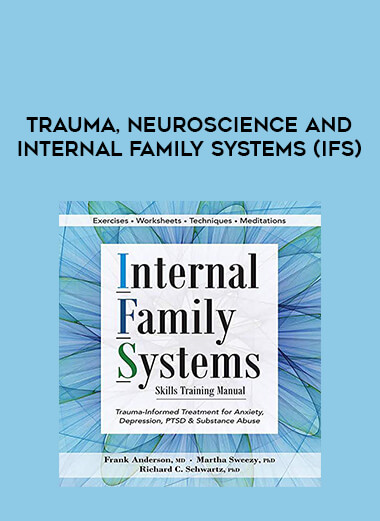Trauma, Neuroscience and Internal Family Systems (IFS)
 Salepage : Trauma, Neuroscience and Internal Family Systems (IFS)
Salepage : Trauma, Neuroscience and Internal Family Systems (IFS)
Arichive : Trauma, Neuroscience and Internal Family Systems (IFS)
Faculty:
Richard Schwartz, PhD | Frank Anderson, MD
Duration:
12 Hours 35 Minutes
Copyright:
May 01, 2017
Product Code:
IRS035001
Media Type:
Online Course
If you have graduated from an IFS Institute Level 1 Training and are applying for IFS certification, this course fulfills 15 IFS hours toward the IFS Continuing Education requirement
Module 1: Find, Focus, and Flesh it out.
We’re going to be looking at the differences between phase-oriented treatment and IFS.
We’re going to be looking at the neuroscience of parts and we’re going to talk about what is specific and relevant to IFS in regards to the treatment of trauma.
Module 2: Self-energy and the Neurobiology of Trauma and Dissociation.
We’re going to be looking at self energy.
We’re going to be talking about the importance of therapist parts.
We’re going to be looking at the difference between empathy and compassion.
For me, as a physician, it’s really important to know the basics so then it can really build on that information so that we can really see where IFS and neuroscience overlaps and interplays with each other.
Module Three: Befriending, Finding out the Fear and Working with Extreme Parts.
It’s one of the things in doing this trauma work for many, many years, extreme parts are really complicated.
It makes the trauma work really hard, clients tend to get frustrated, and then they tend to not follow through.
None of the work leads to unburdening, and then they get frustrated and they go back to their old modalities and way of working because they just get frustrated around extreme parts.
Learn how to work with extreme parts in a way that will help you get over those humps.
Module Four: The Unburdening Process.
“Why don’t people do enough unburdenings?
“What’s so complicated about that?”
Richard Schwartz, PhDRelated seminars and products
IFS Institute
Richard Schwartz began his career as a systemic family therapist and an academic and he is now on the Faculty of the Department of Psychiatry at Harvard Medical School. He is also a Senior Fellow of the Meadows treatment center in Arizona. Grounded in systems thinking, Dr. Schwartz developed the Internal Family Systems (IFS) model in response to clients’ descriptions of various parts within themselves. In 2000, he founded the Center for Self Leadership (now IFS Institute – www.ifs-institute.com), which offers three levels of trainings and workshops in IFS for professionals and the general public, both in this country and abroad. A featured speaker for national professional organizations, Dr. Schwartz has published many books and over fifty articles about IFS.
Frank Anderson, MDRelated seminars and products
Dr. Anderson completed his residency and was a clinical instructor in Psychiatry at Harvard Medical School. He is an executive director of the Foundation for Self Leadership and co-teaches the five-day Level 2 intensive training on IFS, Trauma and Neuroscience with Dick Schwartz. He has maintained a long affiliation with the Trauma Center at Justice Resource Institute in Boston and maintains a private practice in Concord, MA


![[Audio Only] IC94 Keynote 03 - OUT OF MY MIND AND YOURS - Bernie Siegel](https://intellschool.com/wp-content/uploads/2022/02/MrI_A_JRMkeje763RUZqjg-200.jpg)
![[Audio Only] EP95 WS36 - Broad Spectrum Treatment of Sexual Dysfunction - Joseph LoPiccolo](https://intellschool.com/wp-content/uploads/2022/02/Bk3vPYzMr02hHCrj4JKW-w-200.jpg)



























Reviews
There are no reviews yet.